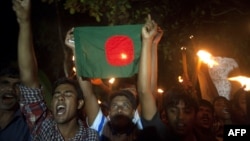Indians and Bangladeshis are celebrating the end of a 68-year state of limbo for tens of thousands of people living along the porous border joining the two nations.
At midnight Friday, local time, India and Bangladesh exchanged more than 150 islands of territory – Bangladeshi territory in India, and Indian territory in Bangladesh – isolated since independence from British colonial rule in 1947.
Residents were granted citizenship in the country of their choice – giving them legal access to schools, medical services and public facilities for the first time.
The inhabitants – about 37,330 in Indian enclaves and 14,200 in Bangladeshi enclaves – were deprived of public services because they had no defined citizenship.
No more hiding identity
"We are very happy, our children will no more need to hide their identity to go to schools," said Bashir Mia, 46. Many people posed as Bangladeshis to get their children admitted to schools in Bangladesh.
"We are free now, we are Bangladeshis," he said.
Celebrants prayed, sang, and lit candles as the nearly seven-decade division was wiped out Saturday, the result of a new border agreement signed by Dhaka and New Delhi in June.
Under the pact, each country will take over most of the enclaves on its territory and residents will have the right to stay where they are or move to the other side of the border.
Most residents of the exchanged territories have chosen to adopt the nationality of the state surrounding them.
Just under 1,000 people on the Bangladeshi side have chosen Indian citizenship. They must resettle across the border, in India, within a few months' time.
Historic moment
Villagers in India's eastern Cooch Behar district celebrated the historic moment by lighting torches and candles.
"We have fought and revolted a lot. We have sat on hunger strike and finally we have gained independence. I forget all sadness today by lighting this torch of happiness. Today is the day to rejoice," a villager told Reuters.
India's External Affairs Ministry described July 31 as a historic day for both India and Bangladesh as "it marks the resolution of a complex issue that has lingered since independence" from British rule.
Chief coordinator of the India-Bangladesh Enclave Exchange Coordination Committee, Diptiman Sengupta, said that the region has the potential to emerge as a major economic hub.
"This agreement will change the image of India's economy in front of the world. We have established a strong relationship with Bangladesh through his agreement," Sengupta said.
"This region has the potential to emerge as a major business hub, if 122 crore (1.2 billion) people of India and 17 crore (170 million) people of Bangladesh, along with the population of neighbouring countries, come together," Sengupta added.
Some material for this report came from Reuters and AP.





